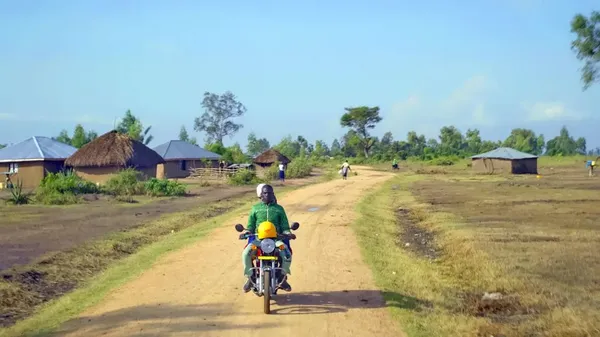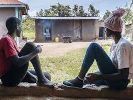Eye For Film >> Movies >> Free Money (2022) Film Review
Free Money
Reviewed by: Jennie Kermode

If you pay attention to politics or social issues, you can’t have failed to notice, in recent years, an increasing amount of discussion of Universal Basic Income (UBI) – the idea that, rather than means testing welfare provision, we simply give everybody the money required to meet their most basic requirements (food, water, housing, warmth), and then as their total incomes mean more of them are over the tax threshold, we simply reclaim the money at that end. There are distinct advantages to this in terms of preventing destitution (as long as additional complications like disability are separately provided for) and minimising administrative costs. Critics on the right, however, object to the idea of people getting something for nothing, whilst critics on the left argue that it doesn’t actually help much with the important project of redistributing wealth. This documentary provides a fascinating glimpse into how it might play out in practice.
The setting is Kogutu, Kenya, a small village where most people have lived hand to mouth for generations, with relatively few getting the opportunity to do more with their lives. Charities have been coming and going from this place (and many like it) for years. The local people are suspicious of them. They make big promises which they often fail to keep. They provide equipment or embark on projects which are supposed to change people’s lives, but which fall short because they fail to take account of local circumstances. They always think they know best.

One day, a woman comes into the village and says that there’s a new idea to help people like them. Instead of doing what other charities have done, her group, which has already acquired its funding, wants to give every one of them over the age of 18 a phone and, through those phones, give each of them $22 per month for 12 years.
There are gasps. The potentially life-changing effect of this is immediately clear. There is also, understandably, suspicion. Why is this happening? Where is the money coming from? Is it dirty money? What will be expected of them in return? A few people discuss a rumour that it comes from Satan worshipers and that anyone who accepts it will be required to sacrifice their first born child.
Some people hold out. Most, eventually, are talked around, thanks in part to support from local clergy. It is explained that, in return, they will have to report back on how they use the money and how it affects the course of their lives – a trivial request given how much $22 is worth in Kenya. Some of the men worry that it will empower women and that, as a result, some of the women will leave their husbands. A mother worries that young people could spend the money unwisely, and could become alcoholics. In other words, the villagers are aware from the start that this could have a social impact which goes beyond simply getting wealthier, but that same savviness helps to protect them. When one teenager says that her plan is to use it to find a way to sing with Justin Bieber, she is not being entirely serious.
Over the course of the rest of the film we return, at intervals, to see how the villagers are doing. There are some obvious gains. Houses has been renovated. One woman has built up a herd of cows. A savings group has been started. There is electricity which, though it is not addressed here, is a key element in ending poverty because it gives people the chance to work or study after dark. There are also subtler benefits which recall the results of similar experiments carried out in Europe. Most of the villagers seem much happier. One woman says that she no longer suffers from high blood pressure.
It’s not a linear progression. As time goes by, more ambitions fall short of realisation. There are tensions with neighbours across the river who always thought of themselves as part of the community and wonder if they sinned in some way such that God has seen fit to leave them out of this opportunity. It emerges that the Kogutu villagers get served first in other areas because everyone knows that they have money. Has the experiment accidentally created a class system? One girl, Jael, struggles when she discovers that she’s been left out of the programme despite (as the villagers insist) living in Kogutu. Ultimately, it’s the way that the community responds to her which tells us most about the potential of this social experiment.
The film, which features contributions from Just Giving’s Michael Faye and several of those working directly with the community, also raises ethical issues. There’s a huge power imbalance between charitable organisations based in the West and the people of Kogutu. The latter have no means of redress if they are harmed by the experiment. is it right to treat people in this way? Faye is big on the idea of trusting people to know what they need, which feels like a step forward, but there are still serious risks.
A brief comparison is made with the way that the US government distributed payments to its own citizens during Covid lockdowns. We are given a fleeting impression of the impact which Covid has had on Kogutu. Other issues here are left unaddressed. Money aside, how have the villagers’ lives been changed by having phones? Have they had access to all the learning opportunities available through the internet?
Though it could have benefited from more context, this is still a valuable film. The social changes which we witness are every bit as significant as the (direct) economic ones. Able to pay their fees for transport in cash, young women no longer feel pressure to trade sexual favours for educational opportunity. As a result, fewer of them will become pregnant and more will complete their education. They will spread their knowledge and share the political awakening which has developed in the village, which is, for the first time, coming to understand in practical terms what wealth equality could mean, and to question why injustice has prevailed for so long.
Free Money screened as part of the 2023 Glasgow Film Festival.
Reviewed on: 11 Mar 2023
















